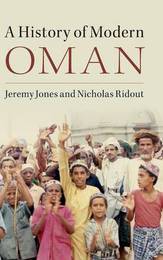
|
A History of Modern Oman
Hardback
Main Details
| Title |
A History of Modern Oman
|
| Authors and Contributors |
By (author) Jeremy Jones
|
|
By (author) Nicholas Ridout
|
| Physical Properties |
| Format:Hardback | | Pages:304 | | Dimensions(mm): Height 236,Width 159 |
|
| ISBN/Barcode |
9781107009400
|
| Classifications | Dewey:953.53 |
|---|
| Audience | | Tertiary Education (US: College) | | General | |
|---|
| Illustrations |
3 Maps; 20 Halftones, unspecified
|
|
Publishing Details |
| Publisher |
Cambridge University Press
|
| Imprint |
Cambridge University Press
|
| Publication Date |
31 August 2015 |
| Publication Country |
United Kingdom
|
Description
The ideal introduction to the history of modern Oman from the eighteenth century to the present, this book combines the most recent scholarship on Omani history with insights drawn from a close analysis of the politics and international relations of contemporary Oman. Jeremy Jones and Nicholas Ridout offer a distinctive new approach to Omani history, building on postcolonial thought and integrating the study of politics and culture. The book addresses key topics including Oman's historical cosmopolitanism, the distinctive role of Omani Islam in the country's social and political life, Oman's role in the global economy of the nineteenth century, insurrection and revolution in the twentieth century, the role of Sultan Qaboos in the era of oil and Oman's unique regional and diplomatic perspective on contemporary issues.
Author Biography
Jeremy Jones has an Oxford-based consulting business and has worked on Oman since the 1980s. His first book Negotiating Change: The New Politics of the Middle East anticipated the Arab Spring. Nicholas Ridout is the only professor of theatre who also writes and researches extensively on the history and politics of the Middle East. He has worked with Jeremy Jones on research in Oman since 1989, alongside his successful career as an academic in theatre and performance studies.
Reviews'This book weaves a deep understanding of Oman's history, politics, economics, religion and, very importantly, culture in a way that is particularly useful in understanding the challenges Oman faces today. A must-read for anyone interested in Oman or an understanding of religion and culture in affecting foreign affairs.' Stephen W. Buck, former US Foreign Service officer, Deputy Chief of Mission and Charge d'Affaires, Muscat (1979-83) 'This book offers an excellent history and analysis of Oman from the eighteenth century to the present. Based on personal knowledge acquired over several decades, as well as a comprehensive command of the literature in the field, it offers measured judgements of the Sultanate's present and future of which all interested in Oman should be aware.' Francis Robinson, Royal Holloway, University of London 'A History of Modern Oman is an impressive portrait of a society that has taken a different road from its Arab neighbors. This is a profound examination of the transition within two generations of a country from its tribal roots to a modern and tolerant society based on consensus and acceptance rather than dictation.' Edward Walker, Hamilton College, New York 'A thorough overview of the significant elements in the Omani narrative over the past few centuries, providing context for understanding modern Oman and helping explain how it has come to play the role it does.' Richard Schmierer, Middle East Policy 'This is easily the most accomplished survey of Oman's recent history to appear since Donald Hawley's Oman and its Renaissance ...' J. E. Peterson, The Middle East Journal '... its detail-rich narrative deepens our understanding of Oman's religious, economic, political, and social specificities in the regional context of the Arabian Peninsula and the Middle East. Scholars and people interested in Middle East history will enjoy A History of Modern Oman - one of the few accounts of Omani history during both the long nineteenth century and the Cold War - at a time when we need more scholarship to understand a regions that undergoing so many changes.' Guillemette Crouzet, Arab Studies Journal
|